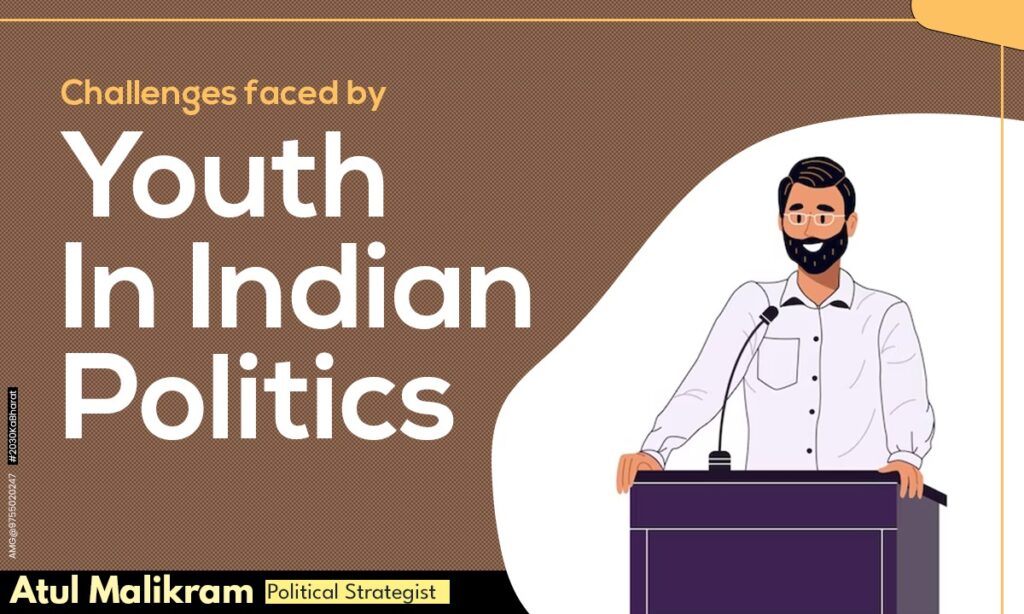Youth and politics have always been topics of great significance in the context of India’s democratic framework. While the idea of youth in politics brings a sense of hope and enthusiasm, it is essential to acknowledge the challenges they face while participating in the political arena. This article aims to delve into the complexities of youth and politics, exploring both the benefits and obstacles they encounter in their journey toward meaningful youth political engagement.
Understanding the Importance of Youth Participation
India, as the world’s largest democratic country, stands as a beacon of political ideals and practices. However, the role of the youth in shaping the nation’s political landscape often remains unclear. Despite youth playing a decisive role in many other countries worldwide, there seems to be a gap in recognizing the significance of their participation in India.
Challenges Faced by Youth in Indian Politics
1. Inadequate Representation: A major challenge is the underrepresentation of youth in political structures. While India has a substantial young population, their presence in legislative bodies and decision-making roles is limited. This can be attributed to several factors, including the dominance of older politicians, limited youth-focused policies, and a lack of opportunities for young leaders to emerge.
2. Lack of Resources: Youth often struggle with limited access to resources, including financial support and campaign infrastructure. Establishing a foothold in politics requires financial backing, which many young individuals may find hard to secure, hindering their entry into the political arena.
3. Negative Stereotypes: Youth involvement in politics is sometimes met with skepticism. Stereotypes about the inexperience or idealism of young politicians can pose challenges in earning the trust of both voters and party leaders. Breaking these stereotypes and proving their competency can be an uphill battle for young politicians.
4. Educational Barriers: In many cases, political parties and institutions favor candidates with strong educational backgrounds and degrees. Young people who may not have had the opportunity to pursue higher education could face barriers to entry into politics.
Benefits of Youth Participation in Indian Politics and Governance
While there are challenges to overcome, the benefits of involving youth in Indian politics and governance are significant and cannot be ignored. These benefits include:
1. Access to Resources: One of the key benefits of being a minority stakeholder in a political party is gaining easier access to party resources. Young members may find it relatively more straightforward to engage in party activities and initiatives compared to their non-minority counterparts. This accessibility can provide them with the tools and support needed to make a meaningful impact on their political journey.
2. Image Enhancement: As a minority stakeholder, youth can contribute to enhancing the image and reputation of their political party. Their energy, enthusiasm, and fresh outlook can attract a broader audience and resonate with younger voters. This, in turn, can improve the party’s ability to secure government funding and gain the trust of the electorate.
The Power of Participation in the Political Process
Engaging in the political process offers numerous advantages, regardless of your age or background. Here are some key benefits:
1. Voice and Representation: Participating in the political process allows individuals to voice their opinions and concerns. Whether aspiring to become elected officials or advocating for important policy matters, the political arena provides a platform to make a difference. Young participants can express their unique perspectives and contribute to shaping the policies that affect them directly.
2. Knowledge and Decision-Making: By actively engaging in politics, individuals can gain a deeper understanding of how government functions and how policies are crafted. This knowledge equips them to make informed decisions, not only in the political sphere but also in their personal and professional lives.
3. Leadership Development: Politics offers ample opportunities for leadership development. Young participants can hone their leadership skills by organizing campaigns, leading discussions, and representing their constituents. These experiences are invaluable for personal growth and future career prospects.
In conclusion, youth participation in Indian politics and governance is not only crucial but also offers a multitude of benefits to those involved. The youth’s energy, fresh perspectives, and dedication can help shape a better future for India. Recognizing the importance of their involvement and providing the necessary resources and support will undoubtedly contribute to a more vibrant and inclusive democratic system in the country. To gain deeper insights into this topic, it is essential to explore further research and engage in discussions on how to harness the potential of India’s young leaders, while addressing the challenges they face.

